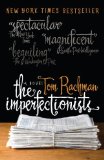Summary | Excerpt | Reading Guide | Reviews | Beyond the Book | Read-Alikes | Genres & Themes | Author Bio

A Novel
by Tom RachmanThis article relates to The Imperfectionists
BookBrowse's Karen Rigby interviews Tom Rachman
BB: How has studying cinema informed your writing?
 TR: At college, I majored in film studies, so movies certainly affected how I tell stories. One strength of cinema is its speed: a movie must grip you and tell a story fast; it ought to pull you completely into the onscreen world. Movies have limits, though, struggling to move beyond what can be seen and what can be heard. The written story allows you to venture more deeply inside characters - a novel explores those aspects of people that, in day-to-day life, we cannot easily see or hear. This is what I hoped to do in The Imperfectionists, to bare the thoughts of a range of people who weren't necessarily shrieking but who were worth hearing. If my book also contains something of the pacing and directness of a good film, then I would be very happy.
TR: At college, I majored in film studies, so movies certainly affected how I tell stories. One strength of cinema is its speed: a movie must grip you and tell a story fast; it ought to pull you completely into the onscreen world. Movies have limits, though, struggling to move beyond what can be seen and what can be heard. The written story allows you to venture more deeply inside characters - a novel explores those aspects of people that, in day-to-day life, we cannot easily see or hear. This is what I hoped to do in The Imperfectionists, to bare the thoughts of a range of people who weren't necessarily shrieking but who were worth hearing. If my book also contains something of the pacing and directness of a good film, then I would be very happy.
BB: In many of the stories, relationships decline after pivotal events or quieter, emotional realizations. Rather than romanticizing the expat experience, they explore loneliness, infidelities, and death, among other struggles...
TR: Life overseas (the novel is set in Rome) can be thrilling and disheartening, liberating and constricting. You have the freedom to invent yourself, but lack the supports that your own culture offers. This makes expats a tight-knit bunch. However, the individual's experience can also be deeply isolating. That theme - being among people yet feeling alone - fascinates me; perhaps it is something I've felt. And it can occur anywhere, not only abroad. One might feel it at work, among acquaintances, even within a family.
BB: In an interview with The Australian you mention the cynicism that permeates the news world, and the imperfection of the enterprise and the characters that inhabit it. What was it like to balance the portrayal of this sometimes ruthless job and the desire to render the characters as endearing?
TR: Working in news is strange: journalists bump up against huge issues every day, yet remain rooted in smaller, personal issues, worrying about slights from colleagues, about promotions, about late buses, about what's for dinner. Their lives straddle the tremendously important and the tremendously trivial. It's inevitable; it's how humans respond. The consequence for journalists is often burnout or cynicism. When I imagined my characters, I didn't conceive of them as likeable or unlikeable, but tried only to understand them. Unexpectedly, this had the effect of making me sympathize even with those who, had I met them in real life, might have been tough to love.
BB: Lest the reader imagine it is a bleak book, resilience is also a strong quality that emerges. How did Arthur Gopal's arc come about?
Read the rest of the interview
![]() This "beyond the book article" relates to The Imperfectionists. It originally ran in April 2010 and has been updated for the
January 2011 paperback edition.
Go to magazine.
This "beyond the book article" relates to The Imperfectionists. It originally ran in April 2010 and has been updated for the
January 2011 paperback edition.
Go to magazine.
What really knocks me out is a book that, when you're all done reading, you wish the author that wrote it was a ...
Click Here to find out who said this, as well as discovering other famous literary quotes!
Your guide toexceptional books
BookBrowse seeks out and recommends the best in contemporary fiction and nonfiction—books that not only engage and entertain but also deepen our understanding of ourselves and the world around us.